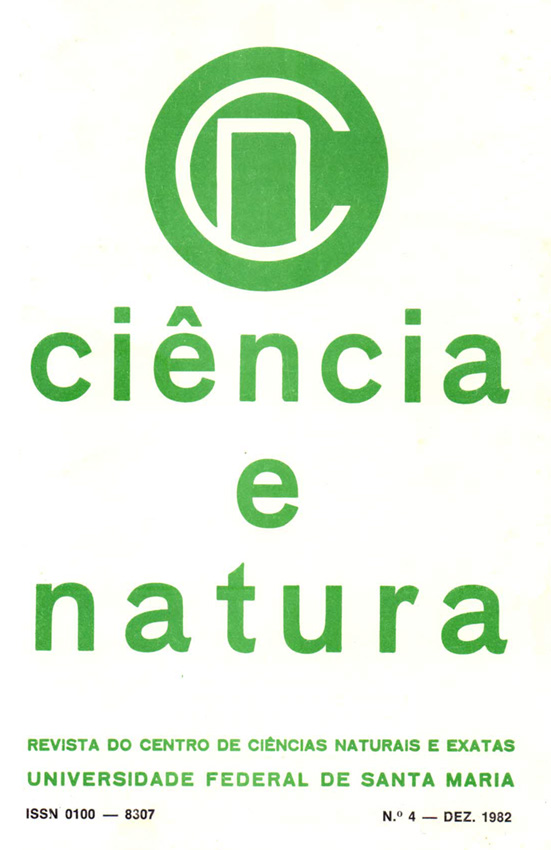The singular value decomposition of a uniform matrix
DOI:
https://doi.org/10.5902/2179460X24924Abstract
In this pape is presented a simple procedure for determination of singular value of uniform non negative matrices. This procedure is recommended for teachers of elementary courses in statistics to students with small basis in matrix algebra.
Downloads
References
BOX, G.E.P. A general distribuition theory for a class of like lihood criteria. Biometrika, 36: 317-346, 1949.
BOX, G.E.P. Some theorems on quadratic forms applied in the study of analysis of variance problems, II. Effects of inequality of variance and correlation between errors in a two way classification. Ann. Math. Stat, 25: 484-498, 1954.
GEISSER, S. Multivariate analysis of variance for a special case. JASA, 8: 660-669, 1963.
GRAYBILL, F.A. Theory and Application of the Linear Models. Duxbury Press, Massachussets, 1976.
IEMMA, A.F. Análise de experimentos em parcelas subdivididas com tratamentos principais dispostos em blocos incompletos balanceados. ESALQ/USP, Piracicaba, 145 p. (Tese de Doutoramento), 1981.
IEMMA, A.F. e H. CAMPOS. Variância dos contrastes clássicos nos experimentos com parcelas subdivididas em blocos incompletos balanceados. Ciência e Natura, 3: 21-27, 1981.
LANCASTER, H.O. The Helmert matrices. Am. Math. Monthly, 72(1): 4-12, 1965.
RAO, C.R. Advanced Statistical Methods in Biometric Research. MacMillan Publishing to, New York, 1952.
SCHEFFÉ, H. The Analysis of Variance. John Wiley, New York, 1959.
SEARLE, S.R. Linear Models, John Wiley, New York, 1971.
WILKS, S.S. Sample criterion for testing equality of means, equality of variances, and equality of covariances in a normal multivariate distribution. An. Mat. Stat., 17: 257-281, 1946.
Downloads
Published
How to Cite
Issue
Section
License
To access the DECLARATION AND TRANSFER OF COPYRIGHT AUTHOR’S DECLARATION AND COPYRIGHT LICENSE click here.
Ethical Guidelines for Journal Publication
The Ciência e Natura journal is committed to ensuring ethics in publication and quality of articles.
Conformance to standards of ethical behavior is therefore expected of all parties involved: Authors, Editors, Reviewers, and the Publisher.
In particular,
Authors: Authors should present an objective discussion of the significance of research work as well as sufficient detail and references to permit others to replicate the experiments. Fraudulent or knowingly inaccurate statements constitute unethical behavior and are unacceptable. Review Articles should also be objective, comprehensive, and accurate accounts of the state of the art. The Authors should ensure that their work is entirely original works, and if the work and/or words of others have been used, this has been appropriately acknowledged. Plagiarism in all its forms constitutes unethical publishing behavior and is unacceptable. Submitting the same manuscript to more than one journal concurrently constitutes unethical publishing behavior and is unacceptable. Authors should not submit articles describing essentially the same research to more than one journal. The corresponding Author should ensure that there is a full consensus of all Co-authors in approving the final version of the paper and its submission for publication.
Editors: Editors should evaluate manuscripts exclusively on the basis of their academic merit. An Editor must not use unpublished information in the editor's own research without the express written consent of the Author. Editors should take reasonable responsive measures when ethical complaints have been presented concerning a submitted manuscript or published paper.
Reviewers: Any manuscripts received for review must be treated as confidential documents. Privileged information or ideas obtained through peer review must be kept confidential and not used for personal advantage. Reviewers should be conducted objectively, and observations should be formulated clearly with supporting arguments, so that Authors can use them for improving the paper. Any selected Reviewer who feels unqualified to review the research reported in a manuscript or knows that its prompt review will be impossible should notify the Editor and excuse himself from the review process. Reviewers should not consider manuscripts in which they have conflicts of interest resulting from competitive, collaborative, or other relationships or connections with any of the authors, companies, or institutions connected to the papers.







